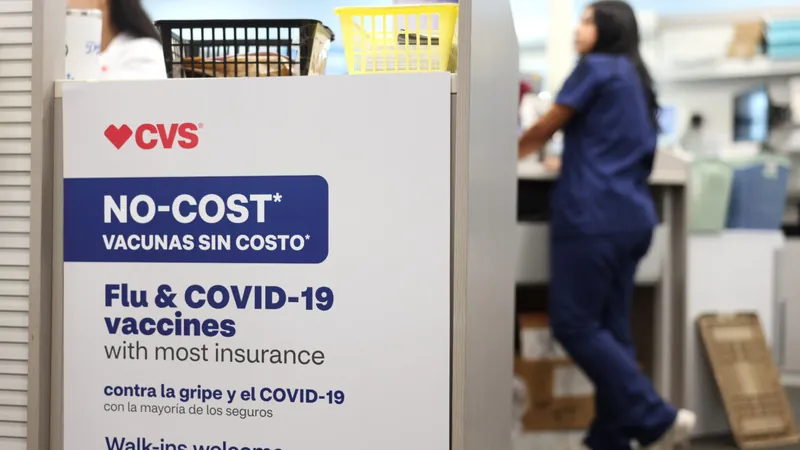
Confusion Over COVID Vaccine Access: What You Need to Know
2025-09-05
Author: Lok
As autumn nears and COVID-19 cases nudge up, many are considering this season's updated vaccine. In prior years, these annual shots were readily taken by anyone over six months old, often at no cost from local pharmacies. This year, however, the landscape has shifted dramatically.
The change comes under the direction of Robert F. Kennedy Jr., a prominent anti-vaccine activist now holding a top health position, who has worked to dismantle vaccination access and undermine established health protocols. His contentious approach has led to restrictions on the COVID-19 vaccine that have caught the attention of medical experts and the public alike.
Dramatic Policy Shifts: How We Got Here
In late May, without official federal communication, Kennedy declared that healthy children and pregnant individuals would no longer have access to COVID-19 vaccinations, making this announcement via a video on Elon Musk's social platform. Medical authorities, including the CDC, were also surprised by this decision.
Major medical organizations wasted no time refuting Kennedy's claims, emphasizing the ongoing vulnerability of pregnant women and young children to severe COVID-19 outcomes. The American Academy of Pediatrics (AAP) and the American College of Obstetricians and Gynecologists (ACOG) have publicly advocated for continued vaccination for these groups.
A Flawed Approval Process
Typically, the vaccination approval process is meticulous, involving both scientists and external experts who review safety and effectiveness data. Historically, this culminates in public meetings where recommendations are thoroughly vetted.
However, under Kennedy's leadership, the FDA announced unilateral updates to vaccine labels, now restricting access primarily to those aged 65 and older, along with certain high-risk individuals. This marked a significant departure from the previous broad access provisions.
Current Guidelines and Confusion
Kennedy's influence led to immediate adjustments in federal immunization schedules; the opportunity for COVID-19 vaccinations during pregnancy was abruptly removed. For children aged 6 months to 17 years, vaccinations could still occur but now require prior approval from a healthcare provider.
As of now, the FDA stipulates that only specific groups can receive the vaccine: Pfizer's mRNA, Moderna's mRNA, and Novavax's protein subunit vaccines are accessible only to those aged 65 and up or younger individuals with specified underlying conditions.
State Variability: A Patchwork of Rules
With the absence of updated ACIP recommendations, vaccine accessibility varies drastically by state. In 19 states, regulations connect pharmacists' ability to dispense the vaccine with ACIP guidelines. Consequently, some pharmacies are unable to administer vaccines without doctor prescriptions, which complicates access for many.
Reports indicate that major chain pharmacies like CVS and Walgreens have either halted vaccine provision or are imposing additional prescription requirements in several states.
Who Can Get Vaccinated?
For individuals meeting the FDA's criteria in states with broader pharmacy vaccination authority, obtaining a vaccine should proceed as usual. However, those under 65 with qualifying health conditions may need to self-attest their eligibility.
For healthy children and adults outside the specified groups, getting vaccinated now involves navigating "off-label" scenarios where pharmacists or doctors may face significant liability concerns.
The Future of Vaccination Policies
The ongoing uncertainty surrounding vaccination access—especially for pregnant individuals—remains a topic of debate. As ACIP reconvenes this month, many are anxiously awaiting further updates on vaccine accessibility.
With a system in disarray and conflicting messages from key health authorities, one thing is clear: the road to COVID-19 vaccination this year is more complicated than ever. Stay informed and proactive as changes continue to unfold.


 Brasil (PT)
Brasil (PT)
 Canada (EN)
Canada (EN)
 Chile (ES)
Chile (ES)
 Česko (CS)
Česko (CS)
 대한민국 (KO)
대한민국 (KO)
 España (ES)
España (ES)
 France (FR)
France (FR)
 Hong Kong (EN)
Hong Kong (EN)
 Italia (IT)
Italia (IT)
 日本 (JA)
日本 (JA)
 Magyarország (HU)
Magyarország (HU)
 Norge (NO)
Norge (NO)
 Polska (PL)
Polska (PL)
 Schweiz (DE)
Schweiz (DE)
 Singapore (EN)
Singapore (EN)
 Sverige (SV)
Sverige (SV)
 Suomi (FI)
Suomi (FI)
 Türkiye (TR)
Türkiye (TR)
 الإمارات العربية المتحدة (AR)
الإمارات العربية المتحدة (AR)